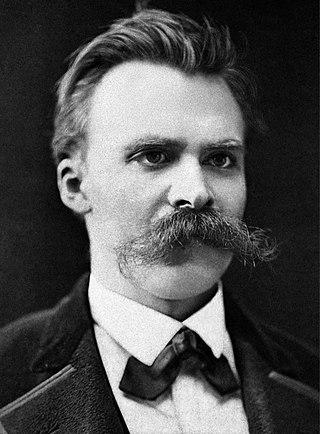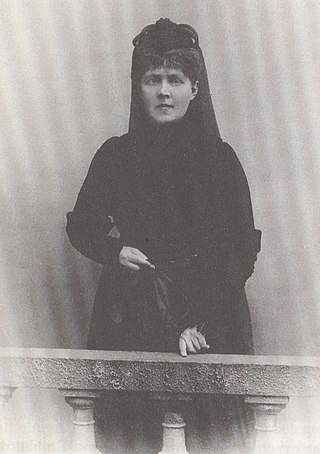Related Research Articles

Friedrich Wilhelm Nietzsche was a German philosopher. He began his career as a classical philologist before turning to philosophy. He became the youngest person to hold the Chair of Classical Philology at the University of Basel in 1869 at the age of 24, but resigned in 1879 due to health problems that plagued him most of his life; he completed much of his core writing in the following decade. In 1889, at age 44, he suffered a collapse and afterward a complete loss of his mental faculties, with paralysis and probably vascular dementia. He lived his remaining years in the care of his mother until her death in 1897 and then with his sister Elisabeth Förster-Nietzsche. Nietzsche died in 1900, after experiencing pneumonia and multiple strokes.
Nihilism is a family of views within philosophy that rejects generally accepted or fundamental aspects of human existence, such as knowledge, morality, or meaning. The term was popularized by Ivan Turgenev and more specifically by his character Bazarov in the novel Fathers and Sons.
The Übermensch is a concept in the philosophy of Friedrich Nietzsche. In his 1883 book, Thus Spoke Zarathustra, Nietzsche has his character Zarathustra posit the Übermensch as a goal for humanity to set for itself. The Übermensch represents a shift from otherworldly Christian values and manifests the grounded human ideal. The Übermensch is someone who has "crossed over" the bridge, from the comfortable "house on the lake" to the mountains of unrest and solitude.

Thus Spoke Zarathustra: A Book for All and None, also translated as Thus Spake Zarathustra, is a work of philosophical fiction written by German philosopher Friedrich Nietzsche; it was published in four volumes between 1883 and 1885. The protagonist is nominally the historical Zoroaster.

The Birth of Tragedy Out of the Spirit of Music is an 1872 work of dramatic theory by the German philosopher Friedrich Nietzsche. It was reissued in 1886 as The Birth of Tragedy, Or: Hellenism and Pessimism. The later edition contained a prefatory essay, "An Attempt at Self-Criticism", wherein Nietzsche commented on this earlier book.
The Will to Power is a book of notes drawn from the literary remains of the philosopher Friedrich Nietzsche by his sister Elisabeth Förster-Nietzsche and Peter Gast. The title derived from a work that Nietzsche himself had considered writing. The work was first translated into English by Anthony M. Ludovici in 1910, and it has since seen several other translations and publications.

Nachlass is a German word, used in academia to describe the collection of manuscripts, notes, correspondence, and so on left behind when a scholar dies. The word is a compound in German: nach means "after", and the verb lassen means "to leave". The plural can be either Nachlasse or Nachlässe. The word is not commonly used in English; and when it is, it is often italicized or printed in capitalized form to indicate its foreign provenance.

The Case of Wagner is a book by the philosopher Friedrich Nietzsche, originally published in 1888. Subtitled "A Musician's Problem".
Mazzino Montinari was an Italian scholar of Germanistics. A native of Lucca, he became regarded as one of the most distinguished researchers on Friedrich Nietzsche, and harshly criticized the edition of The Will to Power, which he regarded as a forgery, in his book The will to power does not exist.
Peter Gast may refer to:
Johann Heinrich Köselitz was a German author and composer. He is known for his longtime friendship with Friedrich Nietzsche, who gave him the pseudonym Peter Gast.

Therese Elisabeth Alexandra Förster-Nietzsche was the sister of philosopher Friedrich Nietzsche and the creator of the Nietzsche Archive in 1894.

Nietzsche contra Wagner; Out of the Files of a Psychologist is a critical essay by Friedrich Nietzsche, composed of selections he chose from among his earlier works. The selections are assembled in this essay in order to focus on Nietzsche's thoughts about the composer Richard Wagner. As he says in the preface, when the selections are read "one after the other they will leave no doubt either about Richard Wagner or about myself: we are antipodes." He also describes it as "an essay for psychologists, but not for Germans". It was written in his last year of lucidity (1888–1889), and published by C. G. Naumann in Leipzig in 1889. Nietzsche describes in this short work why he parted ways with his one-time idol and friend, Richard Wagner. Nietzsche attacks Wagner's views, expressing disappointment and frustration in Wagner's life choices. Nietzsche evaluates Wagner's philosophy on tonality, music and art; he admires Wagner's power to emote and express himself, but largely disdains what the philosopher deems his religious biases.

Friedrich Nietzsche (1844–1900) developed his philosophy during the late 19th century. He owed the awakening of his philosophical interest to reading Arthur Schopenhauer's Die Welt als Wille und Vorstellung and said that Schopenhauer was one of the few thinkers that he respected, dedicating to him his essay Schopenhauer als Erzieher, published in 1874 as one of his Untimely Meditations.

Untimely Meditations, also translated as Unfashionable Observations and Thoughts Out of Season, consists of four works by the philosopher Friedrich Nietzsche, started in 1873 and completed in 1876.

Beyond Good and Evil is a 1977 Italian-French drama-biographical film co-written and directed by Liliana Cavani and starring Dominique Sanda, Erland Josephson and Robert Powell. The story follows the intense relationship formed in the 1880s between Friedrich Nietzsche, Lou Salomé and Paul Rée.

The German philosopher Friedrich Nietzsche owned an extensive private library, which has been preserved after his death. Today this library consists of some 1,100 volumes, of which about 170 contain annotations by him, many of them substantial. However, fewer than half of the books he read are found in his library.

Helen Zimmern was a naturalised British writer and translator born in Germany. She was instrumental in making European culture more accessible in English.

Bazon Brock is a German art theorist and critic, multi-media generalist and artist. He is considered a member of Fluxus. He was a professor of aesthetics at the Hochschule für bildende Künste Hamburg, the University of Applied Arts Vienna and the University of Wuppertal.

Friedrich "Fritz" Schöll was a German classical philologist, known for his editions of Plautus, Varro and Cicero. He was the son of archaeologist Gustav Adolf Schöll (1805–1882) and the brother of philologist Rudolf Schöll (1844–1893).
References
- ↑ Ecce Homo, trans. Walter Kaufmann